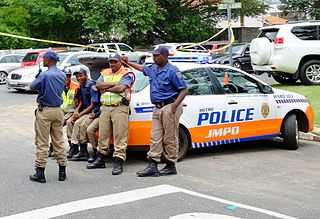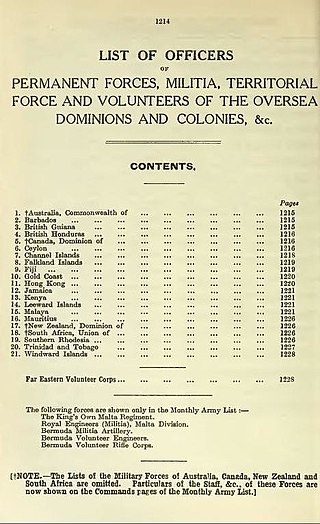
A militia is generally an army or some other fighting organization of non-professional and/or part-time soldiers; citizens of a country, or subjects of a state, who may perform military service during a time of need, as opposed to a professional force of regular, full-time military personnel; or, historically, to members of a warrior-nobility class. When acting independently militias are generally unable to hold ground against regular forces; militias commonly support regular troops by skirmishing, holding fortifications, or conducting irregular warfare, instead of undertaking offensive campaigns by themselves. Local civilian laws often limit militias to serve only in their home region, and to serve only for a limited time; this further reduces their use in long military campaigns. Militias may also, however, serve as a pool of available manpower for regular forces to draw from, particularly in emergencies.

The first written records of the region come from Arab traders in the 9th and 10th centuries. In medieval times, the region was dominated by the Trans-Saharan trade and was ruled by the Mali Empire. In the 16th century, the region came to be ruled by the Songhai Empire. The first Europeans to visit the Gambia River were the Portuguese in the 15th century, in 1447, who attempted to settle on the river banks, but no settlement of significant size was established. Descendants of the Portuguese settlers remained until the 18th century. In the late 16th century, English merchants attempted to begin a trade with the Gambia, reporting that it was "a river of secret trade and riches concealed by the Portuguese."

A gendarmerie is a military force with law enforcement duties among the civilian population. The term gendarme is derived from the medieval French expression gens d'armes, which translates to "men-at-arms". In France and some Francophone nations, the gendarmerie is a branch of the armed forces that is responsible for internal security in parts of the territory, with additional duties as military police for the armed forces. It was introduced to several other Western European countries during the Napoleonic conquests. In the mid-twentieth century, a number of former French mandates and colonial possessions adopted a gendarmerie after independence. A similar concept exists in Eastern Europe in the form of Internal Troops, which are present in many countries of the former Soviet Union and its former allied countries.

Schutztruppe was the official name of the colonial troops in the African territories of the German colonial empire from the late 19th century to 1918. Similar to other colonial armies, the Schutztruppen consisted of volunteer European commissioned and non-commissioned officers, medical and veterinary officers. Most enlisted ranks were recruited from indigenous communities within the German colonies or from elsewhere in Africa.

Chief Constable is the rank used by the chief police officer of every territorial police force in the United Kingdom except for the City of London Police and the Metropolitan Police, as well as the chief officers of the three 'special' national police forces, the British Transport Police, Ministry of Defence Police, and Civil Nuclear Constabulary. The title is also held by the chief officers of the principal Crown Dependency police forces and the Sovereign Base Areas Police in Cyprus. The title was also held, ex officio, by the president of the Association of Chief Police Officers under the Police Reform Act 2002. It was also the title of the chief officer of the Royal Parks Constabulary until this agency was disbanded in 2004.

The British Columbia Provincial Police (BCPP) was the provincial police service of British Columbia, Canada, between 1858 and 1950.

The Frontier Corps, are a group of four paramilitary forces of Pakistan, operating in the provinces of Balochistan and Khyber Pakhtunkhwa, to maintain law and order while overseeing the country's borders with Afghanistan and Iran. There are four Frontier Corps: FC KPK (North) and FC KPK (South) stationed in Khyber Pakhtunkhwa province, and FC Balochistan (North) and FC Balochistan (South) stationed in Balochistan province.

The Ghana Police Service is the main law enforcement agency in Ghana. It is organized at national level and has a unitary command under the Inspector General of Police (IGP). Although there are many regional and divisional commands, they all report to the National Headquarters in Accra.

Law enforcement in South Africa is primarily the responsibility of the South African Police Service (SAPS), South Africa's national police force. SAPS is responsible for investigating crime and security throughout the country. The "national police force is crucial for the safety of South Africa's citizens" and was established in accordance with the provisions of Section 205 of the Constitution of South Africa.

The British Colonial Auxiliary Forces were the various military forces of Britain's colonial empire which were not considered part of the British military proper.
A field force in British and Indian Army military parlance is a combined arms land force operating under actual or assumed combat circumstances, usually for the length of a specific military campaign. It is used by other nations, but can have a different meaning.

The Frontier Constabulary is a federal paramilitary force of Pakistan under the control of the Interior Secretary of Pakistan, which is largely drawn from Khyber Pakhtunkhwa province, but operates in several districts of Pakistan. It is responsible for maintaining law and order, and dealing with situations beyond the capabilities of the civilian Khyber Pakhtunkhwa Police. It also guards against tribal incursions, criminal gangs, and contraband smuggling.
The State Armed Police Forces of India are the police units established for dealing with serious law and order situations requiring a higher level of armed expertise than normal. The State Armed Police Forces exist in addition to the ordinary police services of the various states.

The Gambia Colony and Protectorate was the British colonial administration of The Gambia from 1821 to 1965, part of the British Empire in the New Imperialism era. The colony was the immediate area surrounding Bathurst, and the protectorate was the inland territory situated around the Gambia River, which was declared in 1894.
The 1932 New Year Honours were appointments by King George V to various orders and honours to reward and highlight good works by citizens of the United Kingdom and British Empire. They were announced on 29 December 1931.

The Gambia Regiment was a British Colonial Auxiliary Forces regiment raised in the Gambia Colony and Protectorate that existed between 1901 and 1958. Known as the Gambia Company from 1901 to 1939 and from 1945 to 1950, its strength fluctuated from peacetime and wartime, peaking at two battalions during World War II. The unit saw active service in both world wars, participating in the Kamerun and East African campaigns during World War I and in the Burma campaign during World War II. It was organisationally part of the larger Royal West African Frontier Force, and was part of the 81st Division in World War II.
The Gambia Police Force is the primary independent domestic intelligence, security and law enforcement agency in The Gambia. Under the Ministry of the Interior, the force is headed by an inspector general of police. The current size of the force is 5,000 uniformed and plain-clothed officers. The Gambia Police Force deals with corruption via a specialized fraud and commercial crimes unit.
The Legislative Council of the Gambia was the legislature of the Gambia Colony and Protectorate from 1843 to 1866, and from 1888 to 1960.

During the Second World War (1939–1945), the Gambia was part of the British Empire as the Gambia Colony and Protectorate. At the outbreak of war between the British Empire and Nazi Germany in September 1939, the Gambia was home to the Gambia Company of the Royal West African Frontier Force (RWAFF).
The Barra War, also known as the Anglo-Niumi War or the British-Barra War, was a military conflict that lasted from 1831 to 1832 between forces of the British Empire and the Kingdom of Niumi, in what is now The Gambia.















